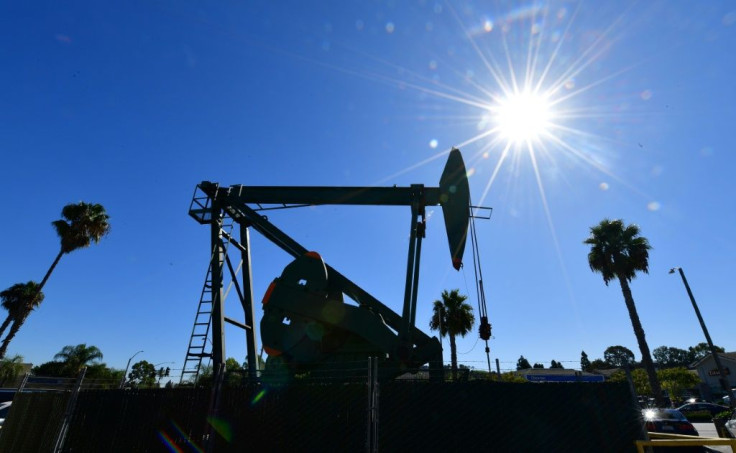Analyst Predicts Oil Price May Sink To Negative-$100 Next Month, Other Experts Also Gloomy

KEY POINTS
- WTI futures settled at minus-$37.63 on Monday, the first time in history the price closed below zero.
- John Browne, chief of BP, also warned that low oil prices are here to stay.
- Low oil prices will lead to hundreds of oil company bankruptcies
Although oil prices appear to have stabilized on Wednesday – rebounding from Monday when West Texas Intermediate crude oil futures sank into negative territory – some analysts warn that prices will remain under pressure as long as supply far outpaces demand.
One analyst, Paul Sankey, managing director of Mizuho Securities, predicts WTI futures could fall to an unfathomable minus-$100 per barrel next month – they settled at minus-$37.63 on Monday, the first time in history the price closed below zero.
"We have clearly gone to full scale day-to-day market management crisis, and as we said when we first called for negative prices, the physical reality of oil is that it is difficult to handle, volatile, potentially polluting, and actually useless without a refinery," Sankey wrote in a Tuesday note.
As businesses, including airlines and factories, shut down across the world in response to the coronavirus pandemic, demand for oil has fallen off a cliff. This has created an oil glut and an exhausted storage capacity – even as the Organization of the Petroleum Exporting Countries has enacted historic output cuts.
A negative oil price theoretically means that producers would pay traders to take the stuff off their hands.
"If you had a stinking barrel of oil in your backyard, would you pay someone [$100 a barrel] to take it away? Yes, and you would probably be relieved you were not charged [$300 a barrel]," Sankey wrote. "That is the situation we are in, of producers having nowhere to go with the inexorable production that takes weeks and months to reduce to zero. Of course, you now need someone to handle it for you. And they are sold out of capacity to do so."
Mizuho had actually forecast negative crude prices back in mid-March.
"Of all the big calls, this was one you would rather not have come true," Sankey said. "But equally, one of the old lines is 'if you don't make a call, you can't be right.'"
Sankey also pointed out that, as bizarre as they seem, negative oil prices have real world consequences.
"This negative price was not a purely paper anomaly," Sankey said. "It was the reality of paper markets meeting physical markets, and the last holders of the May contract for crude being unable to get out of their ultimate requirement to take delivery of crude at landlocked [major trading hub] Cushing, Okla."
Indeed, some organizations are already preparing for negative oil prices.
On Tuesday, the CME Group, the world's largest financial derivatives exchange, advised that it will alter its options pricing and valuation model for certain crude and energy products "to accommodate negative prices in the underlying futures and allow for listing of options contracts with negative strikes."
The switch will remain in place under further notice.
John Browne, the former chief executive of BP PLC (BP), also warned that low oil prices are here to stay.
“The prices will be very low and I think they will remain low and very volatile for some considerable time,” Browne said. “There is still a lot of oil being produced that is going into storage and not being used.”
Browne noted that there was a similar oil glut in the mid-1980s.
“Too much supply, too little demand and prices of oil stayed low for 17 years,” he noted.
Browne further said that expanding awareness of climate change will also keep demand – and thereby prices – low for hydrocarbons.
“Demand for hydrocarbons will continue to be weak,” he said. “And that demand will be filled primarily by those who have no choice but to produce oil… the state oil companies of the world.”
Persistently low oil prices will also likely trigger a wave of bankruptcies.
Branko Terzic, managing director of Berkeley Research Group and former commissioner of the U.S. Federal Energy Regulatory Commission, noted that the most vulnerable U.S. oil companies are those which borrowed heavily in expectation of higher prices.
"There are 1,000 [oil] producers, and some of these are small producers where the well just runs on its own and it produces, and it probably won't be shut down because the costs are very low," Terzic said. "WTI [price] is low because it is landblocked and has to go through pipelines. Secondly, storages are probably full, and thirdly, the country is in shutdown. There is just no market for oil. The refineries don't need it. I haven't used my automobile in a week, and I used to drive every day."
Rystad Energy predicted that up to 533 U.S. oil companies will go bankrupt if the price of oil stays at $20 a barrel.
"[A price of] $30 is already quite bad, but once you get to $20 or even $10, it's a complete nightmare," said Rystad's head of shale research, Artem Abramov, "At $10, almost every U.S. [exploration and production] company that has debt will have to file Chapter 11 or consider strategic opportunities."
As of 1:15 p.m. EDT on Wednesday, WTI futures traded at $13.97 per barrel.
© Copyright IBTimes 2025. All rights reserved.





















